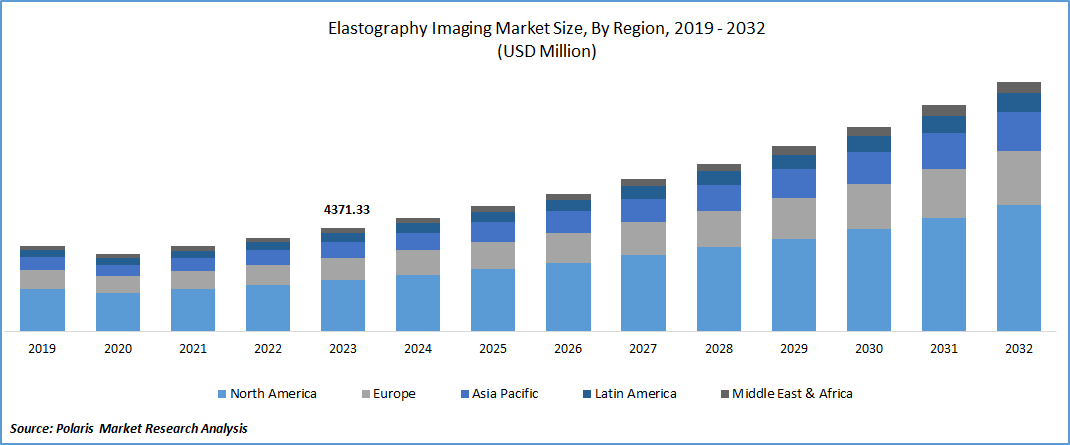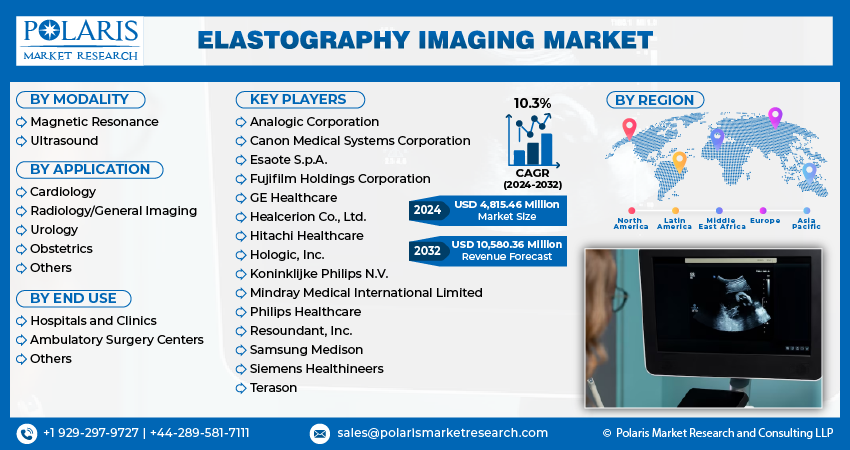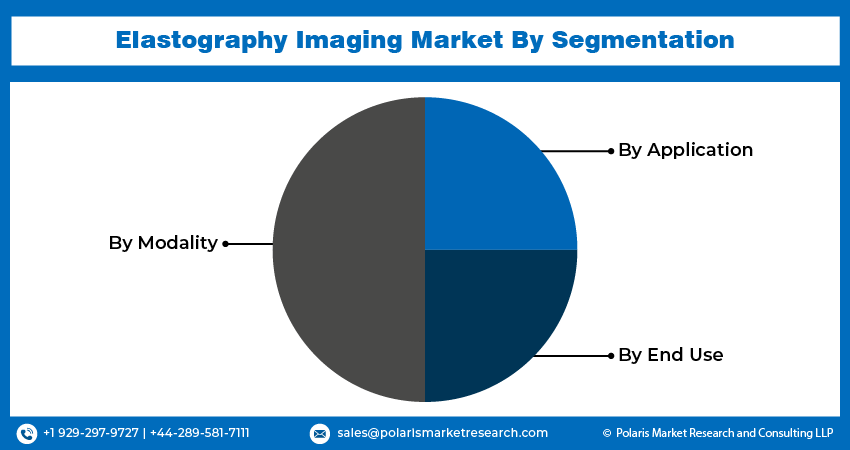
Elastography Imaging Market Share, Size, Trends, Industry Analysis Report, By Modality (Magnetic Resonance, Ultrasound); By Application; By End Use; By Region; Segment Forecast, 2024- 2032
- Published Date:Feb-2024
- Pages: 119
- Format: PDF
- Report ID: PM4623
- Base Year: 2023
- Historical Data: 2019-2022
Report Outlook
- Elastography Imaging Market size was valued at USD 4,371.33 million in 2023.
- The market is anticipated to grow from USD 4,815.46 million in 2024 to USD 10,580.36 million by 2032, exhibiting the CAGR of 10.3% during the forecast period.
Market Introduction
The surge in emphasis on early disease detection propels the elastography imaging market growth. Early detection is critical for improving patient outcomes by enabling timely intervention and treatment initiation, reducing morbidity and mortality rates. By providing insights into tissue characteristics at an early stage, elastography facilitates prompt intervention and treatment decisions while distinguishing between benign and malignant lesions, thereby minimizing unnecessary invasive procedures. This aligns with healthcare's shift towards preventive medicine, driving demand for efficient early diagnostic solutions and fueling Elastography Ultrasound market growth.

To Understand More About this Research: Request a Free Sample Report
In addition, companies operating in the market are entering partnerships to expand market reach and enhance offerings.
- For instance, in November 2021, Canon Medical Systems Corporation and Resoundant, Inc. entered into a licensing agreement with the aim of integrating Resoundant's Magnetic Resonance Elastography (MRE) onto Canon MRI platforms.
Technological advancements are propelling significant growth in the elastography imaging market revenue, revolutionizing medical diagnostics. These advancements enhance system performance, precision, and usability, expanding their applications and increasing demand. Integration with other imaging modalities like ultrasound, MRI, and CT broadens clinical capabilities, and advanced data processing enables real-time imaging and precise tissue characterization.
Favorable reimbursement policies incentivize healthcare providers to invest in this technology. These policies, aimed at improving access to advanced diagnostics while managing costs, cover elastography procedures, alleviating financial burdens. By reimbursing healthcare facilities for elastography services, payers encourage wider adoption of this technology. Reduced out-of-pocket costs for patients under such policies also increase the utilization of elastography imaging. Additionally, recognition of its clinical value and cost-effectiveness further integrates elastography into diagnostic protocols, fostering acceptance among clinicians and facilities.

Industry Growth Drivers
Increasing adoption of non-invasive diagnostic techniques is projected to spur the product demand
The rising adoption of non-invasive diagnostic techniques fuels the growth of the elastography imaging market share. As healthcare trends shift towards patient-friendly procedures, elastography offers a non-invasive approach to assessing tissue stiffness and pathology, reducing the need for invasive procedures like biopsies. With advantages such as reduced risks, shorter recovery times, and lower costs, both healthcare providers and patients favor these methods. Technological advancements in elastography imaging systems further enhance their accuracy and usability, driving adoption across various medical specialties and settings.
Growing geriatric population is expected to drive elastography imaging market growth
The expanding elderly demographic worldwide is fueling the growth of the elastography imaging market trends. Age-related conditions like liver fibrosis, cancer, and musculoskeletal disorders are prevalent among seniors, driving demand for diagnostic solutions. Elastography techniques like transient elastography and shear wave elastography offer non-invasive assessments of tissue stiffness, which is crucial for elderly individuals who may be averse to invasive procedures. These methods accurately diagnose and monitor conditions such as liver fibrosis, breast cancer, prostate cancer, and musculoskeletal issues. With healthcare systems prioritizing preventive care and efficient management of chronic diseases, elastography imaging plays a pivotal role in enhancing outcomes and quality of life for the elderly.
Industry Challenges
High cost is likely to impede the market growth
High costs associated with elastography imaging technology hinder widespread adoption, constraining market growth. Initial equipment, accessory, and software investments are significant, alongside ongoing maintenance expenses. Such financial demands strain healthcare budgets, particularly for smaller facilities, limiting access and exacerbating healthcare disparities. To address this, initiatives are needed to reduce equipment costs, streamline operations, and provide financial aid to healthcare providers. Furthermore, promoting cost-effective utilization through guidelines and reimbursement policies is crucial.
Report Segmentation
The elastography imaging market analysis is primarily segmented based on modality, application, end use, and region.
|
By Modality |
By Application |
By End Use |
By Region |
|
|
|
|
To Understand the Scope of this Report: Speak to Analyst
By Modality Analysis
Ultrasound segment held significant market revenue share in 2023
The ultrasound segment held a significant revenue share in 2023. Ultrasound elastography evaluates tissue stiffness, which is crucial for diagnosing conditions where tissue elasticity is altered. It includes strain elastography, observing tissue deformation, and shear wave elastography (SWE), measuring wave propagation speed to quantify stiffness. These real-time, non-invasive techniques aid in diagnosing liver fibrosis, breast lesions, prostate cancer, and musculoskeletal disorders. Integrated into conventional ultrasound systems, elastography seamlessly supplements structural imaging, enhancing diagnostic accuracy across medical specialties. Its ability to provide functional information alongside structural data improves patient care by facilitating precise diagnosis, staging, and monitoring of various medical conditions.
By Application Analysis
Radiology/general imaging segment held significant market revenue share in 2023
The radiology/general imaging segment held a significant revenue share in 2023. Elastography imaging is a versatile tool in radiology and general imaging, significantly advancing diagnostic capabilities across various medical domains. In breast imaging, elastography aids in distinguishing between benign and malignant lesions, refining breast cancer diagnoses. Additionally, it assists in prostate cancer detection and characterization, guiding biopsies, and treatment planning. Elastography also proves valuable in evaluating thyroid nodules and musculoskeletal conditions. Its potential extends to cardiovascular and gastrointestinal disorders, offering insights into tissue biomechanics and pathology.
By End Use Analysis
Hospitals and clinics segment held significant market revenue share in 2023
The hospitals and clinics segment held a significant market revenue share in 2023. Elastography imaging is increasingly vital in hospitals globally, offering non-invasive diagnostics for liver fibrosis, breast cancer, prostate evaluation, thyroid examination, and musculoskeletal issues. Techniques like transient elastography (TE) and shear wave elastography (SWE) assess tissue stiffness without invasive procedures. Integrated into radiology or ultrasound units, these systems are operated by trained personnel, aiding efficient patient management. Elastography's non-invasive nature enhances clinical outcomes, particularly in hospital settings, where rapid, accurate diagnoses are crucial.

Regional Insights
North America held significant market revenue share in 2023
In 2023, the North American region accounted for a significant market share. The North American elastography imaging technological advancements and demand for non-invasive diagnostics drive market opportunities. Liver fibrosis assessment, addressing conditions like NAFLD and hepatitis C, is a key application. Elastography also aids in breast cancer diagnosis, distinguishing lesions. Major players include GE Healthcare, Siemens Healthineers, and Philips Healthcare, competing through innovation. Regulatory frameworks, such as FDA and Health Canada approvals, shape market dynamics. Expansion is expected, fueled by innovation, widening clinical applications, and the need for enhanced patient outcomes through non-invasive diagnostics.
Asia-Pacific is expected to experience growth during the forecast period. The Asia-Pacific elastography imaging sector is burgeoning due to factors like prevalent liver diseases and heightened cancer screening. Techniques such as transient elastography and shear wave elastography are gaining popularity for liver fibrosis assessment and breast cancer diagnosis. Advancements in medical technology, coupled with infrastructure improvements and global market expansion, fuel this growth.

Key Market Players & Competitive Insights
The market player comprises a diverse array of players, and the expected entry of new contenders is poised to intensify competitive dynamics. Prominent leaders in the market continuously enhance their technologies, striving to maintain a competitive advantage by emphasizing efficiency, reliability, and safety. These entities prioritize strategic endeavors, including forming alliances, improving product portfolios, and participating in collaborative ventures. Their primary goal is to outperform others in the industry, ultimately securing a significant elastography imaging market share.
Some of the major players operating in the global market include:
- Analogic Corporation
- Canon Medical Systems Corporation
- Esaote S.p.A.
- Fujifilm Holdings Corporation
- GE Healthcare
- Healcerion Co., Ltd.
- Hitachi Healthcare
- Hologic, Inc.
- Koninklijke Philips N.V.
- Mindray Medical International Limited
- Philips Healthcare
- Resoundant, Inc.
- Samsung Medison
- Siemens Healthineers
- Terason
Recent Developments
- In November 2020, Resoundant Inc. declared a strategic collaboration with United Imaging Healthcare, aiming to provide cutting-edge magnetic resonance elastography (MRE) on top-of-the-line MRI systems from United Imaging.
- In June 2023, Mindray introduced the Hepatus 6 Diagnostic Ultrasound System, combining real-time two-dimensional ultrasound functionalities with visual transient elastography in a single device.
Report Coverage
The elastography imaging market report emphasizes on key regions across the globe to provide better understanding of the product to the users. Also, the report provides market insights into recent developments, trends and analyzes the technologies that are gaining traction around the globe. Furthermore, the report covers in-depth qualitative analysis pertaining to various paradigm shifts associated with the transformation of these solutions.
The report provides detailed analysis of the market while focusing on various key aspects such as competitive analysis, modalities, applications, end uses, and their futuristic growth opportunities.
Elastography Imaging Market Report Scope
|
Report Attributes |
Details |
|
Market size value in 2024 |
USD 4,815.46 million |
|
Revenue forecast in 2032 |
USD 10,580.36 million |
|
CAGR |
10.3% from 2024 – 2032 |
|
Base year |
2023 |
|
Historical data |
2019 – 2022 |
|
Forecast period |
2024 – 2032 |
|
Quantitative units |
Revenue in USD million and CAGR from 2024 to 2032 |
|
Segments covered |
|
|
Regional scope |
|
|
Competitive Landscape |
|
|
Report Format |
|
|
Customization |
Report customization as per your requirements with respect to countries, region and segmentation. |
FAQ's
The global Elastography Imaging market size is expected to reach USD 10,580.36 Million by 2032.
including Analogic Corporation, Canon Medical Systems Corporation, Esaote S.p.A., Fujifilm Holdings Corporation, GE Healthcare are the top market players in the market.
North America region contribute notably towards the global Elastography Imaging Market.
Elastography Imaging Market exhibiting the CAGR of 10.3% during the forecast period.
The Elastography Imaging Market report covering key segments are modality, application, end use, and region.
